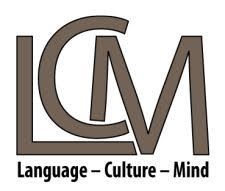Tuning into language: infants’ trajectories of participation in everyday interaction
How do infants become participants of culturally organised social interaction? Where does
shared intentionality begin and how does language develop? In this talk I will explore the
idea that to seek answers to these questions there is a need to focus on processes not
residing within the infant, but by coordination processes constructed within interaction.
Rather than focussing on how infants might “break into” language by acquiring linguistic
structures and learning that words have meaning, I suggest that infants gradually “tune
into” language by experiencing themselves as effective participants in joint actions. This
might help infants grasp that behaviour is meaningful in the first place and therefore useful
in getting things done in the world. I will draw from video-corpora of caregivers and infants
in the first months of infants’ lives and present findings on the ways in which caregivers and
infants organise meaning together within mundane interactions. I will also focus on how
caregivers scaffold infants’ understanding of their bodies and voices as meaningful,
therefore paving an interactional trajectory towards the acquisition of language. Within
these interactions routines play a special role as the vehicles towards language. What starts
off as an embodied experience of language as acting with each-other becomes increasingly
conventionalised as interactions become less idiosyncratic and more rule-like and, thus,
recognisable to a broader cultural community.
